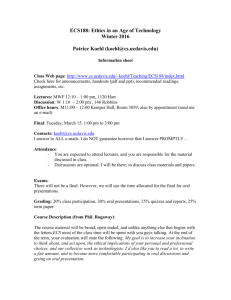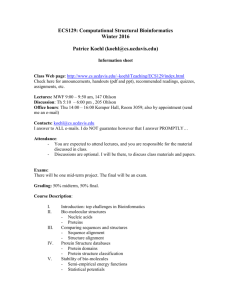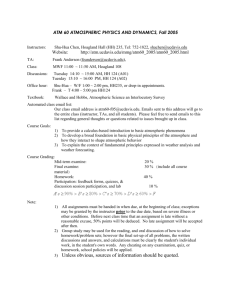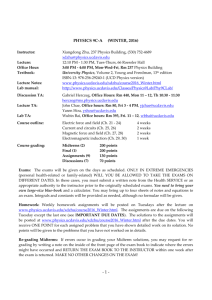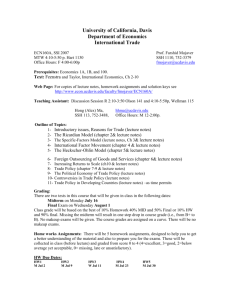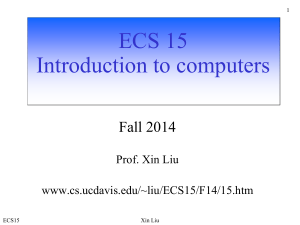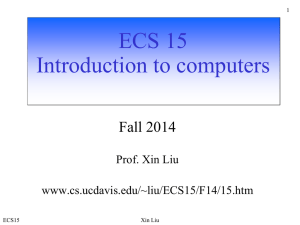ECS15: Introduction to Computers
advertisement
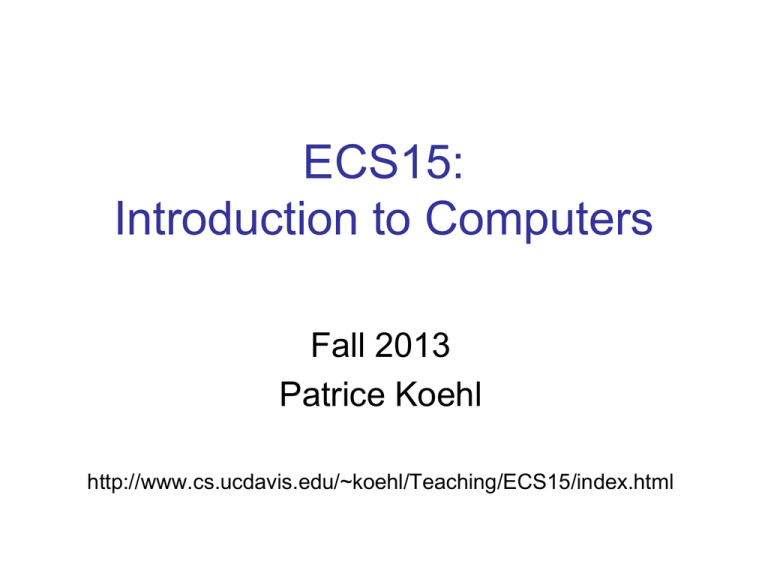
ECS15: Introduction to Computers Fall 2013 Patrice Koehl http://www.cs.ucdavis.edu/~koehl/Teaching/ECS15/index.html When do we meet? • Class: MWF 10:00-10:50 a.m; 1227 Haring; • Labs: – – – – A01 M 12:10 a.m.-3 p.m.; 2020 SLB A02 F 3:10 p.m.- 6:00 p.m.; 2020 SLB A03 W 1:10 pm.-4:00 p.m.; 2020 SLB A04 F 2:10 p.m.-5 p.m.; 2020 SLB Some Important Facts • Instructor: Patrice Koehl http://koehllab.genomecenter.ucdavis.edu/ • Instructor office hour: – Monday 11:00 a.m.-12p.m. at 3106 Kemper Hall – Email: koehl@cs.ucdavis.edu (subject line: ECS 15) • TAs: Darrel Aubrey and Sifat Ferdousi • Reader (for the term paper): Lissa Miller • TA office hour and location – same as the lab sessions Course Material • Textbooks – Michael Dawson, Python programming for the absolute beginner, 2nd edition, Thomson Course Technology, ISBN: 159863-112-8. Also available online: http://site.ebrary.com/lib/ucdavis/docDetail.action?docID=10370091 – Spraul, V. Anton, Computer Science Made Simple, Broadway Books, 2005, ISBN: 0-7679-1707-3. • Class website: http://www.cs.ucdavis.edu/~koehl/Teaching/ECS15/index.html – Check for notes – Check for announcements periodically. Grading – Term paper (20% ) • Computer in an area of your interest – Lab assignments (35% ) • 9 small projects (basic computer skills, basic programming): we remove the lowest grade. • No homework – Midterm (20% ) (one mid-term) • Open book • In class – Final (25% ) • Open book Some rules… • • All lab assignments require individual efforts. Discussions are allowed, no copying allowed. Late policy – – – – • Full credit if on time 50% if within 24 hours 25% if within 48 hours 0 after 48 hours Regrading Policy – One week regrading period after grades returned to students • Incomplete will not be granted – Unless proved emergency with filled emergency form • Academic Integrity – Writing: we use commercial software to check for plagiarism – Lab assignments How to get a good grade? • Computers are rational – Understand, not memorize: this is why tests are open book • Active classroom participation • Do your own assignments – You will understand what you do! • Make sure you check the web site + notes + textbooks • Midterm course review • Final review What we will study • Computers (3-4 weeks) – Hardware: motherboard, processor, memory, I/O devices, etc. – Software and application: – Graphics: image, video, 2D, 3D, game, – History and ethics • The Internet (2-3 weeks) – Layered architecture – Applications: web, email, p2p, etc. – The path of your email/webpage. – LAN: local area network, wireless local area network. – Security • Python Programming (3-4 weeks) – Getting started – Basic concepts: type, variable, I/O – Loops: while, for, – Conditionals: if Why? • Basic knowledge of computers – Order a computer online – Buy a digital camera – Configure your wireless router • Basic understanding of software and tools – Word processing, etc. • Security and privacy • Writing programs to solve your own problems Computers and You • The computer is your “magic wand” – It can be your best friend – It may mean a lot of frustration • It does exactly what you tell it to • Your job is to figure out what/how to tell it! • Learning the language is easy… Laboratories • Go to your registered Lab session if possible. • Priority goes to students registered in the lab session • TAs will be there the whole time to help you. • Yes, you can go and ask any questions related to the class! • Please let the TAs talk about the lab assignment first. • Lab assignments are posted two weeks in advance • All assignments are due on Friday 6pm, at my.ucdavis.edu • Please make sure you submit correctly! • Please check your grade and TA comments (if any). Term paper • 20% of the total grade • ~2500 words (around 10 pages) • A research paper on a topic related to computers that interest you • An opportunity to learn how computers are used in an area you are interested in. • Start early! Timetable • Prospectus due Friday, October 12 • Progress report due Friday, October 26 • Draft due Friday, November 9 • The paper itself is due Wednesday, Nov 28 • All due at 6pm Possible Topics • Computers in education – for teaching reading – for teaching music • Computers in biology – bioinformatics – computational biology • Computers in art, architecture, and design – computer-generated and computer-supported art – computer-aided design • Digital libraries – legal issues (e.g., intellectual property) – technologies • • Music on the Internet Internet on entertainment – P2P file sharing – Video-on-demand – E-books Possible Topics • Social networking websites and their impacts • Online advertising – Google? • Security and privacy • computer and/or Internet addiction • failures regarding computers in schools • famous computer viruses and "worms" • Digital divide Computer Science •Theory of computation •Software engineering •Computer graphics •Computer security and cryptography •Computer networks •Artificial intelligence •Human-computer interface •Bioinformatics •System and architecture (http://en.wikipedia.org/wiki/Accelerating_change) (http://en.wikipedia.org/wiki/Accelerating_change)
